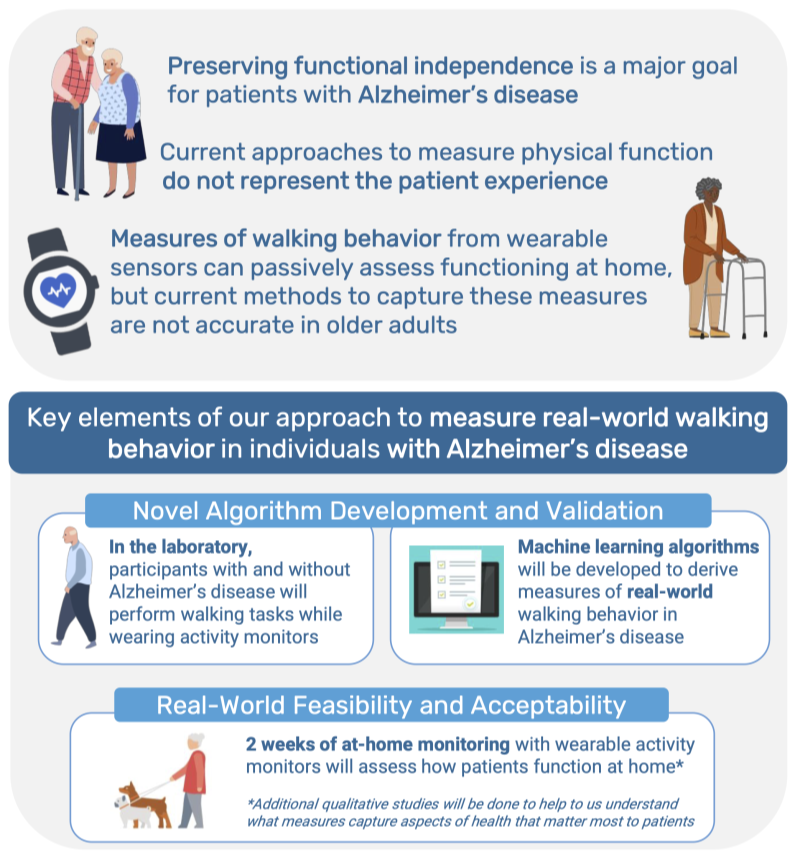Investigators:
Jen Blankenship, VivoSense Inc
Michael Busa, UMass Amherst.
MassAITC Cohort: Year 1 (AD/ADRD)

Project Accomplishments: This pilot study aimed to develop and validate new algorithms for detecting walking behavior using wearable sensors in older adults, including those with Alzheimer’s disease or mild cognitive impairment. The research team recruited 20 participants and collected data in both laboratory and real-world settings using advanced motion capture systems and wearable devices. They created three new step detection algorithms—each using different techniques like activity clustering, peak detection, and hybrid models—and compared them to existing methods. The new algorithms were more accurate in real-world environments, addressing a key gap in current technology for monitoring physical activity in older adults.
The study also explored the relationship between physical activity and cognitive function. While one cognitive test (Mini-MoCA) showed no link to physical activity, another (MMSE) revealed that individuals with higher scores tended to walk more and spend more time in light activity. These findings suggest that real-world walking behavior, as captured by wearable sensors, could serve as a meaningful indicator of cognitive health. The project’s outcomes have been shared through scientific publications, community presentations, and blog posts, and they lay the groundwork for future research and clinical applications in Alzheimer’s disease monitoring and treatment development.
Initial Proposal Abstract: The aim of this project is to develop and validate algorithms to capture measures of real-world walking behavior in patients with Alzheimer’s disease (AD).
Preserving functional independence is a major goal of older adults with AD. Wearable sensors enable remote, passive, and continuous assessments of how patients are functioning at home. Digital measures of walking behavior in AD therefore have the potential to advance AD research and care by creating a better connection between patients, caregivers and clinical evidence used to drive drug development. Wide adoption will require evidence demonstrating that these novel measures are meaningful, accurately quantifiable, and clinically relevant.
This project will address a fundamental measurement problem in accurately assessing walking behavior in older adults with AD and will provide critical validation evidence to support regulatory decision making.
Twenty older adults (≥65 years of age) with (n=10) and without (n=10) mild AD will participate in this study. Participants will complete a motion capture laboratory visit and perform a variety of walking tasks while wearing inertial sensors on their wrist, thigh, and ankle. Machine learning algorithms will be developed to derive measures of walking behavior using raw sensor data as inputs, labeled with truth data obtained via motion capture system. Participants will have the option to wear the sensors at home for 14 days to demonstrate feasibility of characterizing real-world walking behaviors in patients with and without AD.
Outcomes:
- Publication: Returning Individualized Wearable Sensor Results to Older Adult Research Participants: A Pilot Study
 Authors: Shelby L Bachman, Krista S Leonard-Corzo, Jennifer M Blankenship, Michael A Busa, Corinna Serviente, Matthew W Limoges, Robert T Marcotte, Ieuan Clay, Kate Lyden Abstract Background: Wearable sensors that monitor physical behaviors are increasingly adopted in clinical research. Older adult research participants have expressed interest in tracking and receiving feedback… Read more: Publication: Returning Individualized Wearable Sensor Results to Older Adult Research Participants: A Pilot Study
Authors: Shelby L Bachman, Krista S Leonard-Corzo, Jennifer M Blankenship, Michael A Busa, Corinna Serviente, Matthew W Limoges, Robert T Marcotte, Ieuan Clay, Kate Lyden Abstract Background: Wearable sensors that monitor physical behaviors are increasingly adopted in clinical research. Older adult research participants have expressed interest in tracking and receiving feedback… Read more: Publication: Returning Individualized Wearable Sensor Results to Older Adult Research Participants: A Pilot Study - Publication: Capturing Measures That Matter: The Potential Value of Digital Measures of Physical Behavior for Alzheimer’s Disease Drug Development
 Authors: Shelby L. Bachman, Jennifer M. Blankenship, Michael Busa, Corinna Serviente, Kate Lyden, and Ieuan Clay Abstract Alzheimer’s disease (AD) is a devastating neurodegenerative disease and the primary cause of dementia worldwide. Despite the magnitude of AD’s impact on patients, caregivers, and society, nearly all AD clinical trials fail. A… Read more: Publication: Capturing Measures That Matter: The Potential Value of Digital Measures of Physical Behavior for Alzheimer’s Disease Drug Development
Authors: Shelby L. Bachman, Jennifer M. Blankenship, Michael Busa, Corinna Serviente, Kate Lyden, and Ieuan Clay Abstract Alzheimer’s disease (AD) is a devastating neurodegenerative disease and the primary cause of dementia worldwide. Despite the magnitude of AD’s impact on patients, caregivers, and society, nearly all AD clinical trials fail. A… Read more: Publication: Capturing Measures That Matter: The Potential Value of Digital Measures of Physical Behavior for Alzheimer’s Disease Drug Development
